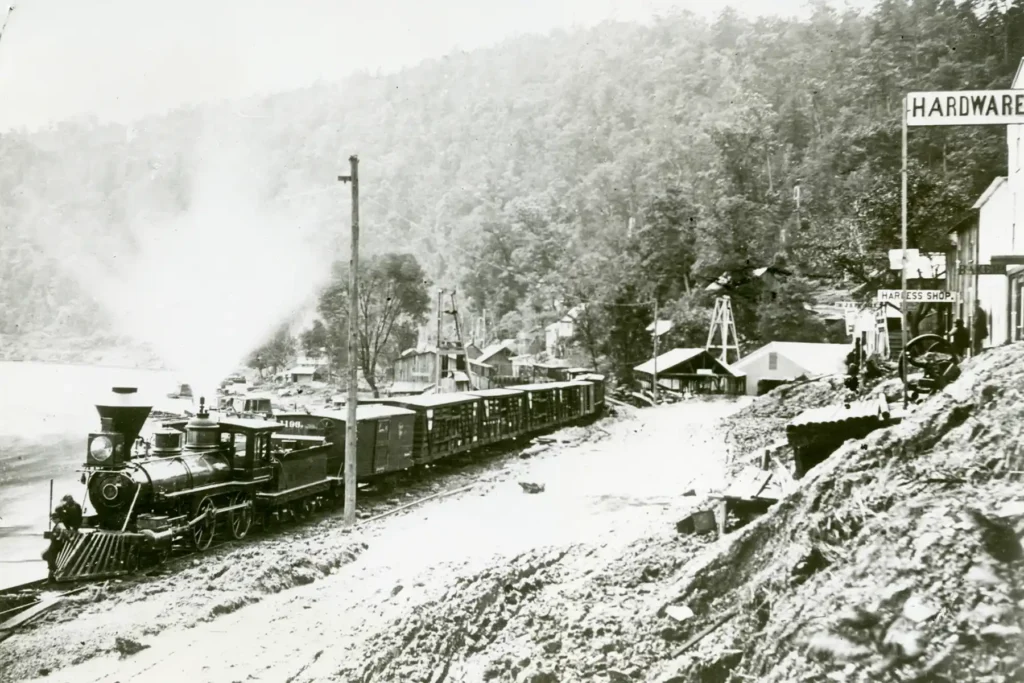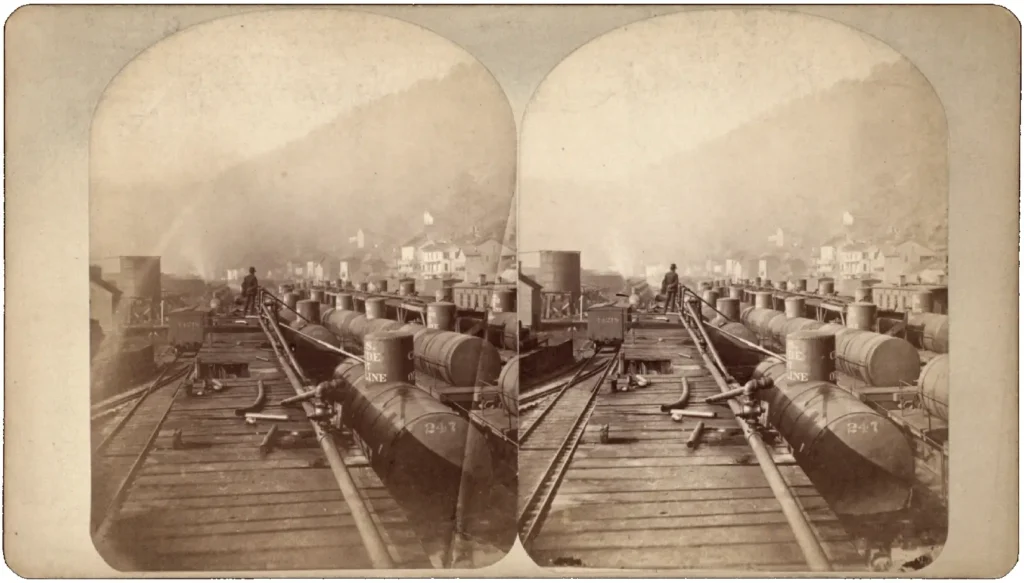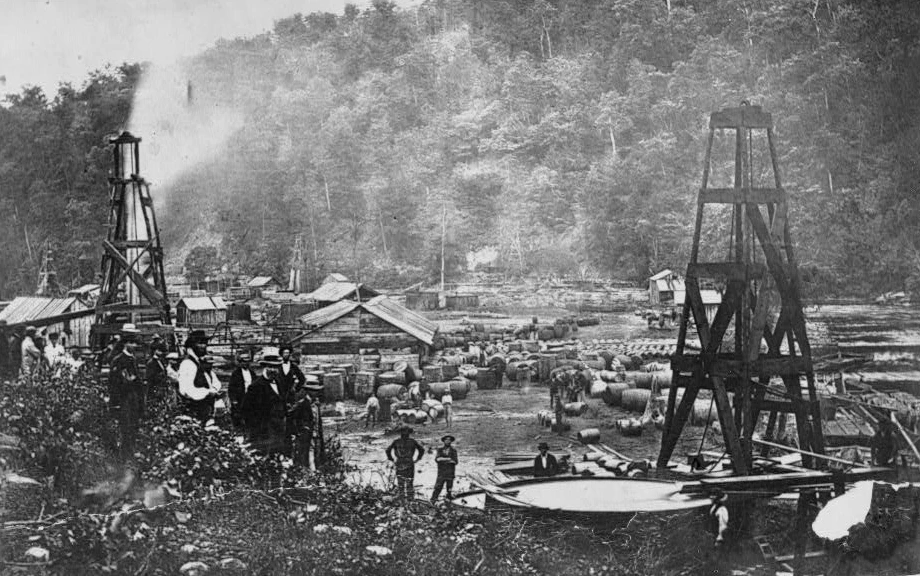Letter to Tidioute
Titusville Morning Herald, February 18, 1871
Correspondence of the Pittsburgh Chronicle.

The Allegheny Railroad and its Management
I wonder how many of the masses of our people realize how much, as a business community, we are indebted to Col. William Phillips, William K. Nimick, Esq., and a few other public spirited citizens — those able to grasp the idea, and possessing the financial ability to handle a million and more dollars, not specially for their own interest, but for the public good.
For years it was the talk in all circles — from the bankers in the Board Parlors, the manufacturers on ‘Change1, and the oil pioneers as they tranquilly sunned themselves on Duquesne Way, down to the boys on the street corners — that it was a shame, with all our natural advantages and special claim on it, that we were permitting the oil trade and the trade of the oil regions [to] slowly but steadily to slip away from us, compelling it to seek remote and uncongenial points, simply for want of railroad facilities to reach us.

For years the Allegheny Valley Railroad trains came and went and stopped and Kittanning, almost near enough to bring the scent of oil with each train, yet stopping just short of its requirements. All appeals to business interest so self-evident to city pride (if we have any) failed, and extension bonds were not worth the value of the paper on which they were printed. But when all hope of its completion seemed almost gone, then public spirited men took hold of it, and will make a good thing of it. And, well, they deserve to. Under the efficient management of Col. Lawrence, the appointments of the road are good. The time is slow but for passengers to the oil regions it suits admirably. One leaves Pittsburgh in a silver palace sleeping car, and wakes up at Oil City for a six o’clock breakfast.
The Oil Regions

Your readers are so familiar with the oil region as to make even a passing mention of it uninteresting. Its forest of derricks, so many of them over dry well — dry as Sahara — the flood of greenbacks that in the flush days of expansion flowed this way from the pockets of the many, and ebbed back to the filled coffers of the few; when every drop of the drill struck not only the sand rock or the oil rock, but the pockets of the hopeful, expectant stockholders; when a barren rocky hillside, or some unheard-of, out-of-the-way stream was worth more than a corner lot in a flourishing town; and when board shanties were the dwelling places of millionaires, and foot deep mud roads their driving ground.
Oil City
As fellow passengers were Colonel D. A. Stewart, whose Columbie [sic] venture enlightened him in the mystery of the oil trade. William Bagley, Esq., and Colonel Samuel Riddle. August Hartze, Esq., was at the Duncan House awaiting the party. The marked men of the oil regions, who used to be pointed out to time once as the man who from investments of one to five hundred dollars had realized as many hundred thousand, are still standing ground the stations — not now to fulfill the part of big Indians at cigar stores, but to attend to their oil interests, which has now settled down to a steady, legitimate, honest business.
It does not seem long since I used to sell goods to the only store in the diminutive village of Oil City, and, now it is quite a city, with the rush incident to a business center. One meets many familiar Pittsburgh names on the signs.
Tidioute
Tidioute, an old town of the lumber regions, but now the center of a vast oil producing territory has a population of about twenty-five hundred, located on a single street of two miles long and forty feet wide. A large business is done here, principally in buying and selling oil and oil materials.

Quite a number of Pittsburghers are located here, amongst them are Captain Taggart, manager of the Tidioute and Warren Oil Company. This company is one of the substantial ones. Its yield in about three hundred barrels per day, and a share in it is a nice thing to have. Only one is owned in Pittsburgh. R. H. Palmer is the fortunate owner, and it yields the comfortable sum of $2,500 to $8,000 per year.
The Ralston Company, of which W. A. Kirkpatrick is secretary, owns one-eighth royalty in this company’s tract. The Washington and Walnut Bend Company, a large number of shares of which are held in Pittsburgh, also owns ten shares of the stock. Alexander Wallace is a good operator, and with his brother, W. W. Wallace, of Pittsburgh, has made some very favorable investments. Henry Fisher, of Fisher Bros., is always ready for any large transactions.
It is a beautiful sight at night to see the horizon in every direction hit up by the burning gas from many wells, which shoot up in every direction. A bright mass of flame, and away off the light of the Hickory region, more bright and grand than our grandest display of the Aurora Borealis.
The great Economite tract is just over the river, yielding about 250 barrels per day. The Fagundas farm — which used to yield with five or six wells — 1,200 barrels per day. Now [it’s] from twenty wells but 250 barrels per day. The New London territory, about three miles from here, is a promising tract, yielding some seventy-five to one hundred barrels per day.
- “Oil Exchange.” ↩︎
